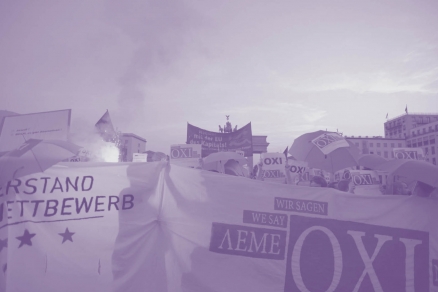
Wars, the pandemic and the climate crisis, combined with poverty and growing social inequality, the shift to the right and crises of social reproduction: we are living in an age of permanent crises.
The climate crisis threatens the livelihood of all human societies. Heatwaves, floods and desertification have been a bitter reality in the Global South for a long time now. The devastating effects of climate change become impossible to overlook in the Global North as well. Ecological instability and social inequality have grown as a consequence, and so have violence, exclusion and isolation. This changes the conditions for left-wing and radical left-wing politics. Even if the climate crisis can no longer be stopped, every tenth of a degree of global warming means the difference between life and death for millions of people. There is no shortcut and the fundamental issue is more urgent than ever: the abolition of capitalism has become a matter of survival. There is no prospect of liberation or overcoming exploitation in the 21st century if this condition is not met.
At the same time, wars such as the Russian aggression against Ukraine or the Gaza War endanger the lives of millions of people. The geostrategic conflict between the USA and China, which is currently carried out as an economic war, barries the potential for a global escalation. The false hope of an era of peace is shattered. Power blocs have long again been vying for global influence. The EU and Germany are increasingly involved in this, although they like to hide behind rhetorics of democracy and human rights.
In the context of power politics and against the backdrop of the massive crises, state intervention in the economy has gained in importance again. In Germany, this includes the "special funds'', which have been used several times to mobilize large amounts of capital, partly to cushion the repercussions of crises such as the coronavirus pandemic, partly to finance the expansion of its military by providing 100 billion Euros for the German military.
In belligerent states, we see the introduction of war regimes, i.e. ruling by decree, the dismantling of the welfare state and a general increase in authoritarian measures. This also reinforces aggressive-authoritarian masculinity and traditional patriarchal structures in societies. The population is urged or forced to take a clear patriotic stance. Voices that speak out in favor of peace and international solidarity are marginalized or suppressed.
The logic of war, the militarization of society and friend-foe distinctions are not limited to states directly involved in wars. The so-called "New Era" has gripped all of Europe: In Germany, rearmament, the export of weapons to crisis and war zones, nationalism and militarily conceived geopolitics dictate the public discourse.
Conventional capitalism is working less and less: Large portions of global capital cannot be utilized as investments in the means of production anymore. Capital therefore seeks new areas for profitable investments on the capital markets, without a viable new accumulation regime having emerged. Thus, capital flows primarily into the privatization of land or resources, in the financialization of areas of life such as housing, health, care services and social security for senior citizens and digital communication. This leads to an increasing amount of people losing access to clean drinking water, healthcare and even food. As a result, impoverishment, hunger and the amount of refugee migration are on the rise globally.
The ruling class's strategies for adapting to the global multitude of crises appear to be chaotic and divided. They shift between a supposedly progressive green-capitalist modernization in regard to civil liberties on the one hand and an openly authoritarian, right-wing conservative to fascist concepts on the other. As contradictory as these strategies may appear, in both cases a small minority isolates themselves and their exponentially growing wealth, while the majority has to bear the consequences of the crises. Yet, neither of these two strategies addresses the obvious contradiction between the interests of global capital and mere survival for humanity at large.
Hope cannot come from above, but solely from revolts, struggles and movements from the bottom. Black Lives Matter, #niunamenos or Fridays for Future are global movements against the unbearable conditions. Their protests have been joined by more people than ever in the last decade. Additionally, many struggles do not transcend national borders but are similar in form and content.
In the global movement cycle of the early 2010s, we could see a common framework: The uprisings and movements of the Arab Spring, the Spanish Indignados, Occupy or Gezi related to one another in their demands for real democracy, their practice of occupying squares and permanent assemblies. In Germany, during the Blockupy actions against European austerity policies, we articulated this as follows: "They want capitalism without democracy - we want democracy without capitalism!”
The current movements also have a common denominator, although it is much more difficult to grasp: Everywhere, matters of life and survival are central. Movements against femicides, against racist murders, against the failure to take action against the climate crisis are united in their focus on survival as their central demand. What starts as a stubborn “no” to the murderous status quo includes the utopian notion of a better world. Despite the unequal conditions and contradictions, our struggles here, "in the heart of the beast", are part of the global movement cycle: in the climate justice movement, the (queer) feminist movement, the anti-war movement or the anti-racism movement: the aim is always to go beyond national boundaries and adopt a transnational perspective of global solidarity and liberation.
